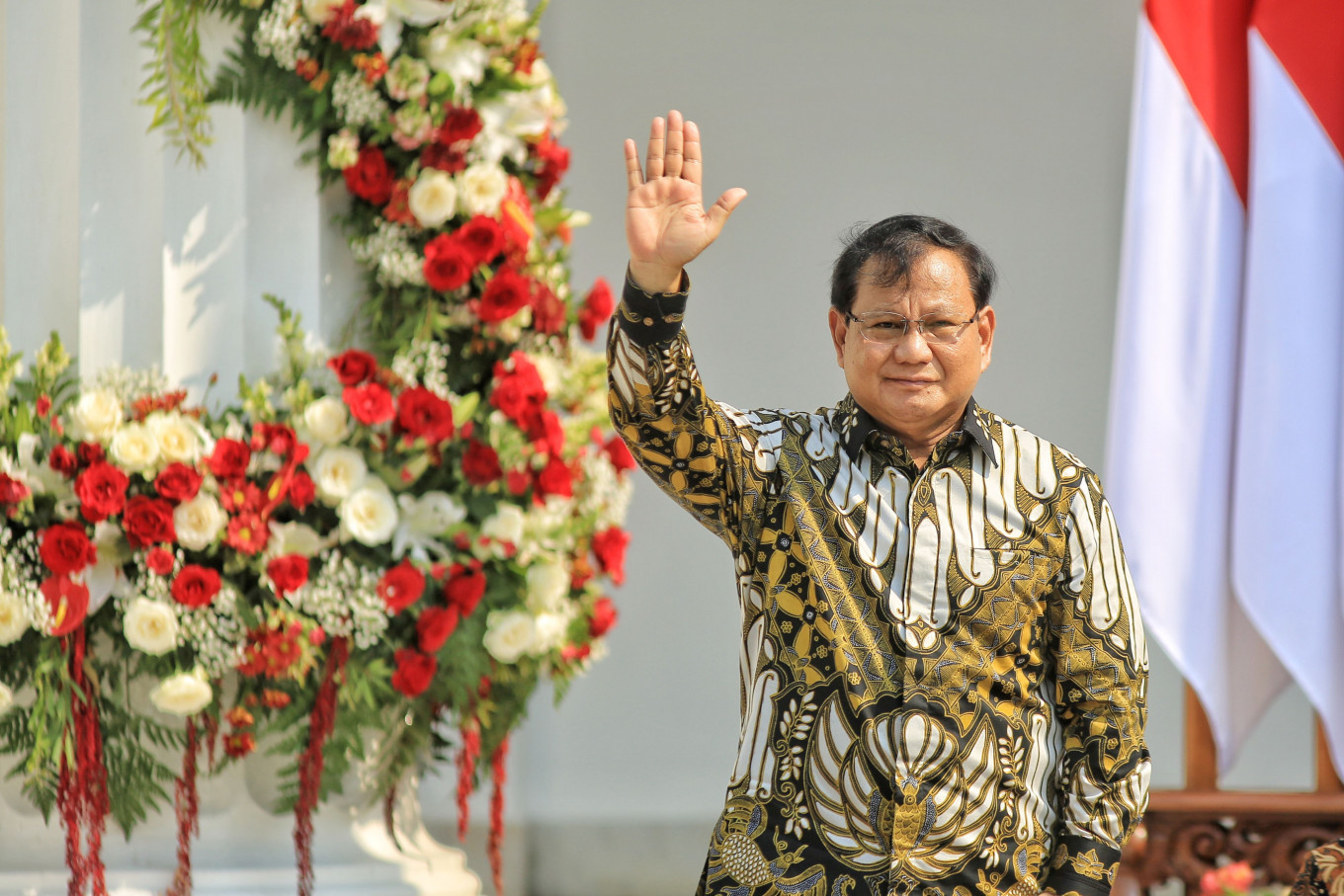Popular Reads
Top Results
Can't find what you're looking for?
View all search resultsPopular Reads
Top Results
Can't find what you're looking for?
View all search resultsIndonesia calls for ‘diplomacy, dialogue’ ahead of Japan meeting
Defense Minister Prabowo Subianto refuses to get embroiled in Japan's dispute with China ahead of a two-plus-two foreign and defense ministers' meeting on Tuesday between Indonesia and Japan.
Change text size
Gift Premium Articles
to Anyone
D
efense Minister Prabowo Subianto has emphasized the need to “prioritize diplomacy and dialogue” in regional disputes ahead of a two-plus-two foreign and defense ministers’ meeting between Indonesia and Japan, as the threat of open conflict at sea looks increasingly possible.
Prabowo is in Tokyo as part of a string of working visits to partner countries that include Japan, Russia and the United Kingdom.
On Sunday, Prabowo called on Japanese Defense Minister Nobuo Kishi and exchanged views on bilateral defense cooperation and regional security.
In their first face-to-face meeting during pandemic times, the ministers spoke about China’s growing influence in the Indo-Pacific region.
According to a statement from Japan’s Defense Ministry, the two ministers underlined the importance of freedom of overflight and navigation and reaffirmed the need to observe international law, including the United Nations Convention on the Law of the Sea (UNCLOS). China is a signatory of UNCLOS, but regional security experts have bemoaned the fact that it often disregards the convention.
The partners have also agreed to hold joint exercises of Japanese and Indonesian forces in the South China Sea.
Kishi told reporters afterward that he and the Indonesian minister agreed to strongly oppose any action by China that could escalate tensions in regional waters.
Read also: Indonesia foreign minister in close contact with Japan on Myanmar
But Prabowo underlined in his own statement on Monday the importance of “using diplomacy and dialogue in resolving disputes between countries, and upholding the rule of law in dealing with any disputes”.
Unlike his Japanese counterpart, Prabowo appeared to tread carefully on the topic of China, especially with Kishi raising “serious concerns” about Beijing’s new coast guard law, which entered into force in February.
The new law allows the Chinese coast guard to open fire on vessels intruding into waters that it considers its own, which Japan worries would affect an ongoing spat with Beijing over the Senkaku/Diaoyu Islands in the East China Sea. Tokyo raised this very concern during a two-plus-two meeting with the United States earlier this month.
In a meeting with US State Secretary Antony Blinken and Defense Secretary Lloyd Austin on March 16, Japan and the US said they “remain opposed to any unilateral action that seeks to change the status quo or to undermine Japan's administration of [the] islands”.
Chinese Foreign Minister Wang Yi said in response that the law did “not target any specific country”, while voicing hope that ties with Japan would further improve.
Nevertheless, concerns over the coast guard law have been raised elsewhere, with international law experts warning that it could spark tension in the South China Sea.
The law is considered by critics to be expansive in regulating waters based on China’s “nine-dash-line”, a sweeping claim in the disputed waters that was invalidated by an international tribunal ruling in 2016.
Read also: Indonesia, Japan defense ministers opposed to assertive moves by China
Chinese fishing boats, accompanied by the Chinese coast guard, still make frequent incursions into Indonesia's exclusive economic zone in the North Natuna Sea, which overlaps with Beijing’s claims in the South China Sea.
Indonesia had voiced its concern over the coast guard law when it was first introduced last year, with Foreign Minister Retno Marsudi saying in November that officials would “consult” with their Chinese counterparts on the matter.
At the time, ahead of the ASEAN summit, Retno said she was hopeful that the legislation would not impinge on regional peace and stability, even as Indonesia respected the rights of countries to produce their own national laws.
Indonesia has maintained a neutral position over the great power rivalry between the US, its allies and China, while stressing that the South China Sea should be maintained as a stable and peaceful sea.
A revived Quadrilateral Security Dialogue, which counts the US, Japan, Australia and India among its members, has launched a charm offensive in the Indo-Pacific, as it seeks to contain China’s growing influence, experts say.
Meanwhile, Jakarta has opted for a more inclusive approach through the ASEAN Outlook on the Indo-Pacific region, which includes rather than isolates China in robust regional cooperation.
Prabowo and Kishi are due to meet again on Tuesday alongside Minister Retno and Japanese Foreign Minister Toshimitsu Motegi for the second two-plus-two meeting between Indonesia and Japan since December 2015.
The meeting was proposed during Japanese Prime Minister Yoshihide Suga’s visit to Indonesia in October last year, with the aim of “concretizing cooperation” in the security and defense sectors.
The two sides, at the time, talked about speeding up discussions on the transfer of defense equipment and technology.










